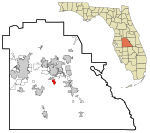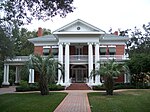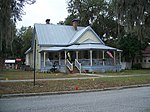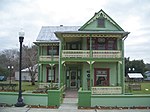Bartow ( BAR-toh) is a city and the county seat of Polk County, Florida, United States. Founded in 1851 as Fort Blount, the city was renamed in honor of Francis S. Bartow, the first brigade commander of the Confederate Army to die in combat during the American Civil War. It is part of the Lakeland−Winter Haven Metropolitan Statistical Area, which had an estimated population of 787,404, as of July 1, 2022. According to the 2020 Census, the city had a population of 19,309.
Located near the source of the Peace River, Bartow is approximately 39 miles (63 km) east of Tampa, Florida and 50 miles (80 km) southwest of the Greater Orlando area. The city is near the center of "Lightning Alley" and has frequent afternoon thunderstorms in the summer, but typically has sunny and mild winters. Government, mining, and agriculture are the major sectors of the area's economy. The primary roads in the Bartow area are U.S. Route 17, U.S. Route 98 and State Road 60, which provide access to locations throughout Central Florida.
The official city nickname is the "City of Oaks and Azaleas". Three districts within the city are on the National Register of Historic Places. Other historic landmarks include the Old Polk County Courthouse built in 1909 and Bartow High School, formerly Summerlin Institute, the oldest high school in the county. Summerlin Academy now uses the space and was named for the historic school. Although Bartow has been eclipsed in population, importance and name recognition by other cities in the county, particularly Lakeland and Winter Haven, the city has retained its small city heritage and its distinctive Southern culture. With the annexation of 18,000 acres (73 km2) of former phosphate mining land owned by the Clear Springs Land Company, Bartow's population is projected to increase to over 25,000 by 2025 and over 45,000 by 2030.










